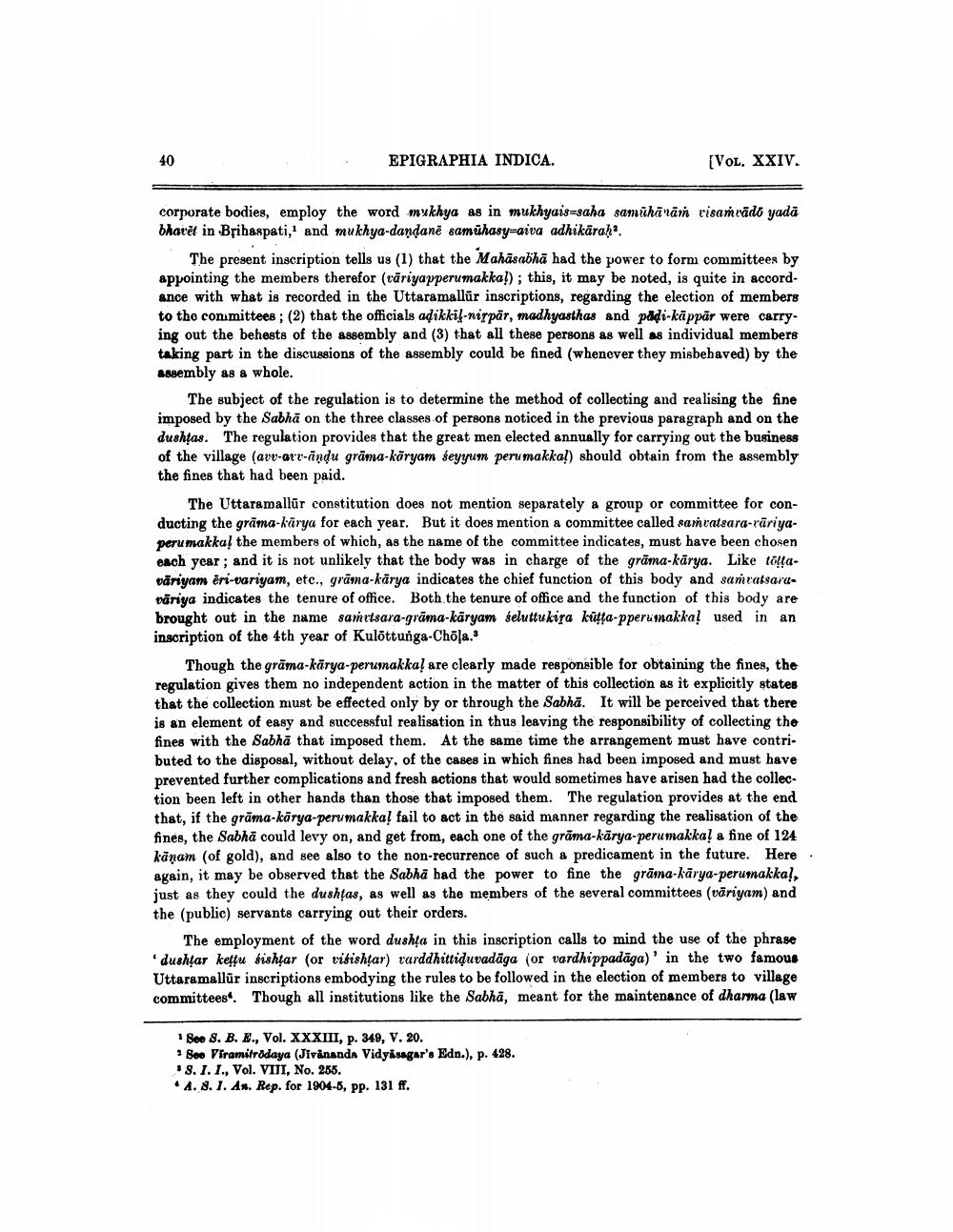________________
EPIGRAPHIA INDICA.
[Vol. XXIV.
corporate bodies, employ the word mukhya as in mukhyais=saha samūhārām risarādo yadā bhavēt in Brihaspati,' and mukhya-dandane samühasy=aiva adhikarah".
The present inscription tells us (1) that the Mahāsabhā had the power to form committees by appointing the members therefor (vāriyapperumakka!); this, it may be noted, is quite in accordance with what is recorded in the Uttaramallūr inscriptions, regarding the election of members to the conmittees; (2) that the officials adikkil-nispār, madhyasthas and padi-kāppār were carrying out the behests of the assembly and (3) that all these persons as well as individual members taking part in the discussions of the assembly could be fined (whenever they misbehaved) by the assembly as a whole.
The subject of the regulation is to determine the method of collecting and realising the fine imposed by the Sabhā on the three classes of persons noticed in the previous paragraph and on the dushtas. The regulation provides that the great men elected annually for carrying out the business of the village (avv-are-andu grāma-kāryam seyyum perumakka!) should obtain from the assembly the fines that had been paid.
The Uttaramallur constitution does not mention separately a group or committee for conducting the grāma-karya for each year. But it does mention & committee called samvatsara-rāriyaperumakkaļ the members of which, as the name of the committee indicates, must have been chosen each year, and it is not unlikely that the body was in charge of the grāma-karya. Like tõltaväriyam ēri-variyam, etc., grāma-karya indicates the chief function of this body and saniratsaravāriya indicates the tenure of office. Both the tenure of office and the function of this body are brought out in the name sametsara-grāma-kāryam seluttukira kutta-pperumakkal used in an inscription of the 4th year of Kulottunga-Chõla.
Though the grāma-kārya-perumakkal are clearly made responsible for obtaining the fines, the regulation gives them no independent action in the matter of this collection as it explicitly states that the collection must be effected only by or through the Sabha. It will be perceived that there is an element of easy and successful realisation in thus leaving the responsibility of collecting the fines with the Sabhā that imposed them. At the same time the arrangement must have contributed to the disposal, without delay, of the cases in which fines had been imposed and must have prevented further complications and fresh actions that would sometimes have arisen had the collection been left in other hands than those that imposed them. The regulation provides at the end that, if the grāma-karya-perumakkaļ fail to act in the said manner regarding the realisation of the fines, the Sabhā could levy on, and get from each one of the grāma-kärya-perumakkal a fine of 124 kānam (of gold), and see also to the non-recurrence of such a predicament in the future. Here. again, it may be observed that the Sabhā had the power to fine the grāma-kārya-perumakkal, just as they could the dushtas, as well as the members of the several committees (vāriyam) and the (public) servants carrying out their orders.
The employment of the word dushta in this inscription calls to mind the use of the phrase 'dushtar keffu fishtar (or vitishțar) varddhittiduvadāga (or vardhippadāga)' in the two famous Uttaramallür inscriptions embodying the rules to be followed in the election of members to village committees. Though all institutions like the Sabhā, meant for the maintenance of dharma (law
1 See 8. B. E., Vol. XXXIII, p. 349, V. 20. • Ser framitródaya (Jivananda Vidyasagar's Edn.), p. 428. .8. 1. 1., Vol. VIII, No. 265. • 4. 8. 1. An. Rep. for 1904-5, pp. 131 ff.




